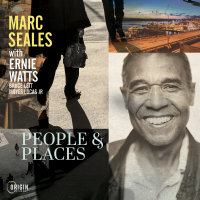Home » Jazz Articles » Big Band Report » Los Angeles Jazz Institute Festival - Woodchopper's Ball: Part 4-4
Los Angeles Jazz Institute Festival - Woodchopper's Ball: Part 4-4
Four Points by Sheraton at LAX
Los Angeles, CA
May 23-27, 2018
Part 1 | Part 2 | Part 3 | Part 4
Panel 3: Cousins -Moderated by Ken Borgers
Moderated by Ken Borgers, this panel featured
Woody Herman
band / ensemble / orchestra1913 - 1987
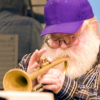
Ron Stout
trumpet
Mark Lewis
saxophoneb.1958

Mike Brignola
saxophone, baritoneJerry Pinter
saxophone, tenor
Frank Tiberi
saxophone, tenorb.1928

John Fedchock
tromboneb.1957

Jeff Hamilton
drumsb.1953

Ed Soph
drumsb.1945
Concert 12: Road Father -Music of the Seventies -CSULB Concert Jazz Orchestra with Special Guests: Alan Broadbent and Gary Anderson
This concert featured a first class university jazz band, Cal State University Long Beach (CSULB) Concert Jazz Orchestra, with special guests
Alan Broadbent
pianob.1947

Gary Anderson
woodwindsb.1947
Jeff Jarvis
trumpetGary Anderson's arrangement of Copland's "Fanfare For The Common Man" opened the concert, with a spirited and inventive guitar solo, before guest Gary Anderson played a robust, muscular tenor saxophone solo, ultimately becoming inaudible beneath the crescendoing ensemble.
"Adam's Apple," by

Wayne Shorter
saxophone1933 - 2023

Chick Corea
piano1941 - 2021
Alex Flavell
piano
Keith Jarrett
pianob.1945
Stephen Wood
composer / conductorb.1977
"Duke Ellington's Sound Of Love," the wonderful ballad by

Charles Mingus
bass, acoustic1922 - 1979
Tyler Kreutel
drums
Lennie Tristano
piano1919 - 1978
As he introduced his highly-regarded trio, leader/drummer Jeff Hamilton mentioned that this outfit—with

Tamir Hendelman
piano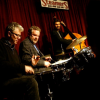 "
data-original-title="" title="">Christoph Luty on bass—had now been performing together as a unit for eighteen years. This was readily apparent by the trio's empathic, tight and hard-swinging performance delivered on this Sunday afternoon.
"
data-original-title="" title="">Christoph Luty on bass—had now been performing together as a unit for eighteen years. This was readily apparent by the trio's empathic, tight and hard-swinging performance delivered on this Sunday afternoon. Hamilton, drumming alumnus of the mid 1970s Woody Herman band, put together a terrific program that included some imaginative and clever reinterpretations of key Herman repertoire, as well as some of their current, JazzWeek chart-topping album, Live At San Pedro. The trio continues to extend the lineage and traditions of hard-swinging jazz piano trios, with strong links to the

Oscar Peterson
piano1925 - 2007

Monty Alexander
pianob.1944

Gene Harris
piano1933 - 2000

Count Basie
piano1904 - 1984
"Sybil's Day," by Jeff Hamilton, was a hard-swinging, rabble-rouser, featuring a very exciting, bluesy Hendelman piano solo. Hamilton surprised with an inclusion of the iconic Second Herd classic, "Four Brothers," opening with the sounds of

Jimmy Giuffre
clarinet1921 - 2008
An arcobass feature for Christoph Luty was George Gershwin's "Someone To Watch Over Me," with some delicious piano re-harmonisation emerging beneath the bass melody, and tasteful Hamilton brushes. A thoughtful piano solo, gently meandering in the bridge section, was followed by Luty's bass returning to the melody, and his inspired bass cadenza. A mid-tempo re-imagining of "Poinciana" respectfully including nuances of

Ahmad Jamal
piano1930 - 2023
Dizzy Gillespie's "Woody'n'You," written for Woody in the early 1940s, featured a sprightly Hendelman piano solo, and a melodic Luty bass solo, amid an interactive piano-drums conversation, before a masterful, high-energy drum solo from Hamilton. For "Bijou," by

Ralph Burns
piano1922 - 2001
The trio's final offering was the blues "Cousins" by " data-original-title="" title="">Johnny Coppola, with its usual raunchy introduction, and featured a rollicking Hendelman piano solo, and a bass solo in which Luty deftly traded with himself—playing alternately regular bass solo, and then arcobass. Hendelman then played a chorus of unaccompanied right-hand piano, a chorus with two hands, then together with the trio, finishing as raunchily as they had begun. So ended an outstanding concert of toe-tapping, hard-swinging, trio piano jazz, but not before a standing ovation from the very attentive, enthusiastic audience.
Concert 14: John Fedchock Big Band
John Fedchock's reputation as a gifted trombonist and composer/arranger was established during his tenure with Woody Herman in the early1980s and has continued, predominantly on the East Coast, in the years since. During this time, he has released many outstanding big band albums featuring his compositions. In this concert, he showcased some of his works, spanning the past three decades, most prominently with selections from his critically acclaimed 2015 Album, Like It Is.Fedchock assembled a front-rank big band cast for this West Coast performance, including many of his fellow 1980s Herman alumni—trumpeters Mark Lewis and Ron Stout, saxophonists Mike Brignola and Jerry Pinter, and drummer Jim Rupp. The band hit the ground running with "Up And Running," title track of his 2007 album, a fast 'blues-with-a-tag.' Fedchock led the way with a fleet trombone solo, before an agile, boppy trumpet solo from Mark Lewis, a ferocious alto solo from Brian Scanlon, a serpentine tenor solo from
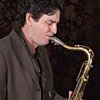
Rob Lockart
clarinet
Tom Luer
clarinet, bass"The Chopper," from Fedchock's 1988 On The Edge album, was introduced by the leader as having been derived from combinations of Woody Herman clarinet 'licks,' and was featured at the 50th Woody Herman anniversary concert at Carnegie Hall. It was a hard-swinging, bluesy tune, featuring a unison reed section riff interplaying with a trumpet riff. Solos included Mike Brignola's rollicking baritone sax,

Dave Bryant
keyboards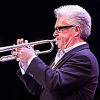
Peter Olstad
trumpetFedchock introduced his arrangement of

Thelonious Monk
piano1917 - 1982
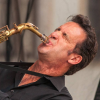
Brian Scanlon
trumpetJim Rupp
drums
Trey Henry
bass
Thad Jones
trumpet1923 - 1986
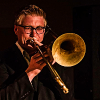
Ryan Dragon
trombone
Oliver Nelson
saxophone1932 - 1975
Another Fedchock arrangement from Like It Is was "Ojos De Rojo," by

Cedar Walton
piano1934 - 2013
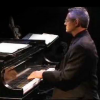
Ed Czach
pianoThis pleasant concert concluded with a fast "Limehouse Blues," a Fedchock arrangement from his 1992 album, New York Big Band, with plenty of room for soloists to display their chopsmanship. Opening with two choruses of super-fast bebop from pianist Czach, the reeds pick up the very smooth, unison melody over crescendo ensemble work. Mark Lewis obliged with a magnificent, confident trumpet solo, in two choruses of sustained brilliance. Tom Luer, no less inspired, played two choruses of rapid-fire, bebop alto magic, Rob Lockart gave two choruses of very articulate, big-toned tenor, before a Lockart-Luer saxophone chase, in eight-bar trades, and a final powerful end from a tight ensemble, who executed this demanding chart very well.
Concert 15: Woody Herman Orchestra -Directed by Frank Tiberi
For the finale of the festival, the irrepressible Frank Tiberi, associated with the Woody Herman organization since the late 1960s, presented a concert, leading the continuing WHO (Woody Herman Orchestra), the personnel almost entirely comprising alumni. Tiberi, now a sprightly 89, and still in top form on clarinet, tenor and soprano saxophones, and fronting the WHO, demonstrated, as if there were ever any doubt, that regular inoculations of the music of Woody Herman would probably increase herd immunity.Opening with their erstwhile signature theme, "Blue Flame," they quickly launched into some fast Ellingtonia, "It Don't Mean A Thing If It Ain't Got That Swing." This was a tour-de-force with solo space for many—Mike Brignola's friendly baritone; Dave Ryan's cheerful, fleet trombone and John Fedchock's fast-and-furious trombone and then trombone trades; Mark Lewis' fiery, bright bebop trumpet and Ron Stout's mellow, fluid trumpet, and then trumpet trades; and vigorous tenor sax choruses from Frank Tiberi and Gary Anderson, before the final ensemble blast.
Jimmy Giuffre's evergreen "Four Brothers," a major landmark in the evolution of modern jazz big-band language, has remained prominent in the Herman repertoire since its debut in 1947, and is always a winner. The 'Brothers' sax section of Frank Tiberi, Rob Lockart and Jerry Pinter on tenor saxophones and Mike Brignola on baritone sax excelled in their section work, unison passages and solos, with strong support from the driving rhythm section, particularly Jim Rupp's drums. Ralph Burns' 1948 ballad beauty, "Early Autumn," featured the sensuous saxophone section passages and, for a change, Ron Stout's trumpet on the melody in place of Woody's alto sax bridge. Alan Broadbent took a playful piano solo, full of tasteful block chords, and Tiberi excelled with a tender tenor sax solo. Herman's "Apple Honey" was taken at breakneck speed (I counted 300 beats per minute), and as usual, was an energetic workout for many soloists. Double choruses were heard from Rob Lockart's rapid-fire tenor, Fedchock's 'bull-at-the-gate' trombone, Mark Lewis' blistering bebop trumpet and Ron Stout's flurries of mellow, post-bop trumpet. Lewis and Stout sparred in trumpet trading for two more choruses, and Broadbent took an exuberant piano solo, with notes just flying by. Tiberi took the Woody clarinet role, over nicely-crafted, plunger trombone-plus-reeds backgrounds, before the grand entrance of trumpeter

Kye Palmer
trumpet
Pete Candoli
trumpet1923 - 2008
Next was the John Fedchock arrangement of the beloved Raksin/Mercer ballad "Laura." Opening with a mellow, brassy, flugels-plus-bones introduction, Fedchock himself led with the melody, over his thoughtfully arranged ensemble backgrounds. He continued into a wonderful, virtuosic trombone solo, followed by some dynamic section work, crescendoing to bold brass backgrounds, before returning to a quiet ending with mellow brass.
Tony Klatka's arrangement of

John Coltrane
saxophone1926 - 1967
"Greasy Sack Blues" composed and arranged by trumpeter
Don Rader
trumpetb.1935
Harold Arlen's "Come Rain Or Come Shine," arranged by Bill Stapleton, was a feature for Ron Stout's flugelhorn. Taken at a slow, swing tempo, Stout caressed the melody above the mellow ensemble passages, and played a very thoughtful flugelhorn solo. "Woodchoppers' Ball," now in its eighties, continues to age well and still evokes the relaxed swing of its earliest incarnations. Its catchy head-arrangement of a simple, repeating-noted melody has been through many evolutions, captured on many recordings over the band's history, including its overlaying with such blues countermelodies as "Jumpin' With Symphony Sid." Frank Tiberi took the Woody clarinet melody, before affable solos from Rob Lockart's easy-going tenor sax, Dave Ryan's relaxed, gruff trombone, Mark Lewis' bright trumpet, Alan Broadbent's laid-back, Basie-ish swing, with quotes from "Lester Leaps In" and jagged chordal reharmonisations with shards of "C-Jam Blues." Trey Henry played some brilliant, rhythmically tricky bass. The final head used "Blues Walk" as a countermelody, jumping up a half-step, and finishing with more Kye Palmer trumpet pyrotechnics.
After an intermission,

Bill Holman
composer / conductor- 2024
John Coltrane's "Central Park West," arranged by John Fedchock, began with a pensive intro of brushes, noodling piano and bass. Another brassy reading of the melody bought out its rich harmonies, joined by a nice unison saxophone countermelody. Frank Tiberi's beautiful and brilliant tenor saxophone solo lead to a crescendoing ensemble then quiet trombones in unison with a flugelhorn countermelody. Tiberi returned to take the band home, probably one of the finest ballad performances of the festival. Alan Broadbent composed and arranged "Sugarloaf Mountain," a medium, straight-eight piece, which featured John Fedchock's relaxed trombone on the melody over flugelhorn backgrounds. He went on to play a very mellifluous solo, and an exuberant brass section passage handed back to Fedchock's trombone for the final melody and vigorous solo vamping to the finish. Johnny Green's "Body and Soul," immortalized by

Coleman Hawkins
saxophone, tenor1904 - 1969
"Fanfare For The Common Man," by Copland, arranged by Gary Anderson (and heard earlier in the day by the CSULB) which became a 1970s Herman Herd anthem, began with its dramatic three-trombone fanfare, and continued into the intro vamp, with brilliant, insistent drumming from Jim Rupp and dextrous electric bass lines from Trey Henry. Rob Lockart played an adventurous flute solo over the vamp, with nice 'outside' fluttering phrases. Jerry Pinter soloed with his big tenor sound, up close to the mike, before a dynamic Jim Rupp drum solo and a climactic ending by the band, which had executed Anderson's chart superbly. The final piece for the concert and for the entire festival, was mid 1960s Herman staple, "Cousins," by " data-original-title="" title="">Johnny Coppola and

Vince Guaraldi
piano1928 - 1976
Ken Poston's final wrap-up at the close of the festival acknowledged the musicians and the superb music, and the great efforts of those who volunteered their time and energy to make it happen, and encouraged patrons to sign up for the October LAJI festival: "Something Cool—Celebrating the Great Vocalists of The West Coast Jazz Era."
Tags
Big Band Report
Simon Pilbrow
United States
Mark Lewis
Mike Brignola
Jerry Pinter
Frank Tiberi
John Fedchock
Jeff Hamilton
Ed Soph
Alan Broadbent
Gary Anderson
Jeff Jarvis
Wayne Shorter
Tanner Olivas
Phineas Crisp
Chick Corea
Alex Flavell
Cade Gotthardt
Keith Jarrett
Stephen Wood
Ken Eernisse
Erik Larsen
Charles Mingus
Tyler Kreutel
Lennie Tristano
Ryan DeWeese
Tamir Hendelman
Christoph Luty
oscar peterson
Monty Alexander
Gene Harris
Count Basie
Jimmy Giuffre
Ralph Burns
John Coppola
Rob Lockart
Tom Luer
Dave Ryan
Pete Olstad
Thelonious Monk
Brian Scanlon
Jim Rupp
Trey Henry
Thad Jones
Ryan Dragon
Oliver Nelson
Cedar Walton
ED CZACH
Kye Palmer
Pete Candoli
Tony Klatka
John Coltrane
Don Rader
Bill Holman
Coleman Hawkins
Vince Guaraldi
Comments
PREVIOUS / NEXT
Support All About Jazz
 All About Jazz has been a pillar of jazz since 1995, championing it as an art form and, more importantly, supporting the musicians who make it. Our enduring commitment has made "AAJ" one of the most culturally important websites of its kind, read by hundreds of thousands of fans, musicians and industry figures every month.
All About Jazz has been a pillar of jazz since 1995, championing it as an art form and, more importantly, supporting the musicians who make it. Our enduring commitment has made "AAJ" one of the most culturally important websites of its kind, read by hundreds of thousands of fans, musicians and industry figures every month.
Go Ad Free!
To maintain our platform while developing new means to foster jazz discovery and connectivity, we need your help. You can become a sustaining member for as little as $20 and in return, we'll immediately hide those pesky ads plus provide access to future articles for a full year. This winning combination vastly improves your AAJ experience and allow us to vigorously build on the pioneering work we first started in 1995. So enjoy an ad-free AAJ experience and help us remain a positive beacon for jazz by making a donation today.

Los Angeles
Concert Guide | Venue Guide | Local Businesses
| More...






 Buy Now
Buy Now





